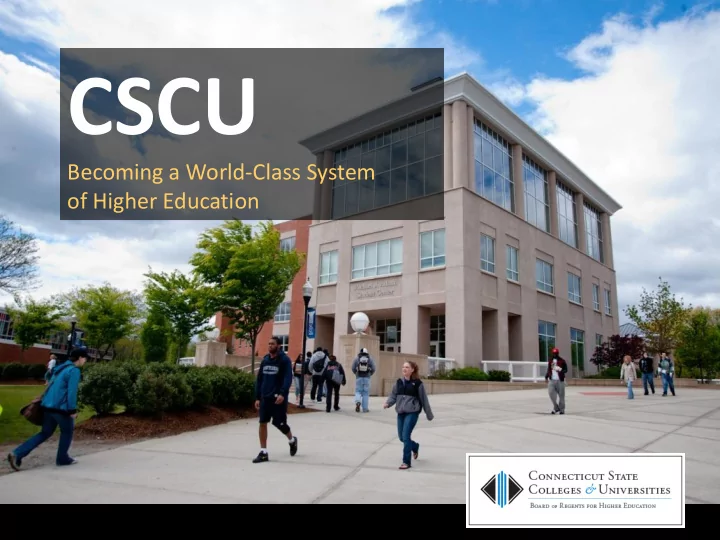

CSCU Becoming a World-Class System of Higher Education
CSCU The Connecticut State College & University System For over 160 years, Connecticut’s state colleges & universities have played a critical role in our educational landscape, preparing students to succeed, providing accessibility to lifelong learning, and ensuring a talent pool for state employers. • Over 120,000 full and part-time, credit and non-credit students • 96% of students are Connecticut residents • 80% of students remain in Connecticut to work and live
CSCU Connecticut’s System of Higher Education Governed by the Board of Regents for Higher Education, CSCU is comprised of four state universities, 12 community colleges, and the state’s only public online college. 2,900 Degrees & Certificates 1,200 degree programs, and 1,700 certificate programs 121,000 Students 1 Full & part-time, credit & non-credit 11,462 Employees Over 6,000 faculty, and over 5,000 counselors and staff (1) Data source for 2012-13 and community college is the 12 month unduplicated headcount enrollment for both credit and non-credit obtained from SWRXF22. Prior years can be found at the IPEDS Data Center, 1993-94 to 2011-12
CSCU In Connecticut’s Communities Connecticut state colleges & universities are uniquely positioned to meet student needs and workforce demand
CSCU Educating the Workforce With high school censuses expected to drop By 2020, 70% of 1.8% annually for the next 10 years, CSCU must develop an innovative enrollment plan to keep Connecticut’s jobs will up with future workforce demand. New require postsecondary initiatives reach: education • Working students • Returning military and veterans • Distance learners • High school students • Professionals seeking to build skills
Connecticut’s Declining High School Graduates NCHEMS, The Context for Education Policymaking in Connecticut , 2013
Change in College Attainment from 2000 to 2011 (Age 25 to 64) Connecticut declined nearly 6% NCHEMS, The Context for Education Policymaking in Connecticut , 2013
Percentage of Jobs in 2020 that Will Require a Postsecondary Education, by State 70% of Connecticut’s jobs will require a college education NCHEMS, The Context for Education Policymaking in Connecticut , 2013
Median Annual Wages for Workers (Age 25 to 64) NCHEMS, The Context for Education Policymaking in Connecticut , 2013
Board of Regents’ Strategic Goals A successful first year Accessible More students will complete a first year of college. Improve student success Affordable Graduate more students with the skills to achieve life/career goals. Accountable Maximize affordability and sustainability Making attendance affordable and our institutions financially sustainable. Cultivate innovation and economic growth Create academic environments that cultivate innovation and prepare students to succeed in the 21 st century job market. Ensure equity Eliminate achievement disparities among ethnic/racial, economic, and gender groups .
Transform CSCU 2020 Uniting 17 Institutions to Improve Student Experience Connecticut State College & University System • Asnuntuck Community College • Capital Community College • Central Connecticut State University • Charter Oak State College Online • Eastern Connecticut State University • Gateway Community College • Housatonic Community College • Manchester Community College • Middlesex Community College • Naugatuck Valley Community College • Northwestern CT Community College • Norwalk Community College • Quinebaug Valley Community College • Southern Connecticut State University • Three Rivers Community College • Tunxis Community College • Western Connecticut State University
Connecticut State Colleges & Universities One System to Serve Connecticut Transform CSCU 2020 will unite the 12 community colleges, four state universities, and Charter Oak State College as one interdependent system that will improve student experience: • Create a single application • Establish a common academic calendar • Build strong partnerships with business to give students access to internships, externships, and career networking • Make it easier to navigate core administrative functions • Build opportunity for system-wide course registration and degree pathway management • Develop a system-wide academic/facilities master plan to strategically map out program expansion
Keeping Higher Education Within Reach Making College Accessible & Affordable Transform CSCU 2020 will: • Establish a long-term tuition model to help students plan for the cost of college • Provide seamless credit transfer within system schools to improve affordability and reduce time to degree • Improve student retention and increase enrollment rates • Expand early college programs to reduce remediation and decrease time to degree • Build high-tech smart classrooms to facilitate learning
Transform CSCU 2020 On Campus & Online Expand Online Education • Reach more distance learners • Provide flexibility for working students • Offer CSCU students more course options Go Back to Get Ahead Serves residents seeking to complete degrees by offering college credits at no cost to students Reaching Non-Traditional Students • Returning military personnel and veterans • Working adults seeking degree completion • Professionals bolstering skills • High school students
12 Community Colleges Training Tomorrow’s Workforce Aligning workforce development with the fastest- growing career clusters will better prepare students for careers — and retrain current workers to respond to industry need. Transform CSCU will expand advanced manufacturing programs to increase student capacity and incumbent worker training programs. It will also fund a system-wide academic/facilities master plan to strategically map out program expansion.
Four State Universities Building on a Strong Academic Foundation Transform CSCU 2020 will strengthen our state universities and build on our strong teacher preparation programs. More support for new teachers will help the state narrow the achievement gap, reduce the need for remedial education, and better prepare students for their academic careers. Increased investment in our state universities will: • Improve the student learning environment • Increase graduation rates • Improve student retention • Streamline operations
The Future of CSCU and Connecticut Transform CSCU 2020 will build on rigorous academic programs and upgrade the CSCU system to the benefit of students and the statewide economy. • Ensure the strongest academic outcomes • Make it easier for students to transfer credits and navigate system school resources • Strengthen partnerships between CSCU and business and industry • Identify efficiencies that save taxpayer and tuition dollars • Ensure CSCU is a strong partner in the state’s ongoing economic revitalization efforts
Recommend
More recommend